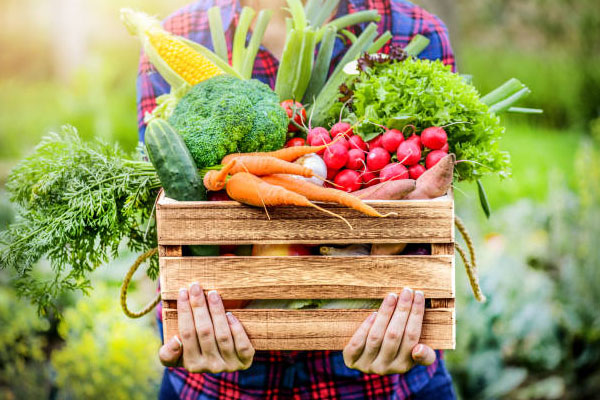Are Organic Foods Worth the Price Tag?
Discover the value of organic foods and whether they justify the higher price Explore the benefits, common misconceptions, certifications, and environmental impact to make informed choices about your dietary preferences
Organic foods have become increasingly popular in recent years, with more consumers seeking out these products for a variety of reasons. The primary question that often arises is whether the higher price associated with organic foods is justified. Are organic foods truly worth the extra cost? In this article, we will explore the various factors that can help you make an informed decision when it comes to choosing between organic and conventional foods. From the potential benefits to the common misconceptions, organic certifications, and the environmental impact, we'll delve into all the aspects you need to consider before deciding if organic foods are worth their price.

Are Organic Foods Worth the Price Tag?
The question of whether organic foods are worth the higher price is a subject of ongoing debate and consideration. To make an informed decision, it's essential to examine various aspects related to organic foods, including their potential benefits, common misconceptions, organic labels and certifications, cost comparisons with conventional foods, as well as the environmental and ethical considerations. Let's delve into these key factors to determine if the premium on organic products is justified.
The Benefits of Organic Foods
Organic foods have gained popularity for several reasons, and many people believe they offer numerous advantages over conventional options. Let's explore the key benefits of choosing organic foods:
1. Reduced Exposure to Pesticides
Organic farming practices minimize the use of synthetic pesticides, resulting in lower pesticide residues in organic produce. This reduces the potential health risks associated with pesticide exposure.
2. Nutrient-Rich Choices
Organic foods are often touted as nutrient-rich options. Research suggests that organic fruits and vegetables may have higher levels of certain vitamins, minerals, and antioxidants.
3. No Synthetic Additives
Organic processed foods, like snacks and packaged goods, are typically free of synthetic additives, preservatives, and artificial flavors and colors. This can be appealing to those seeking a cleaner, more natural diet.
4. Antibiotic and Hormone-Free
Organic livestock farming prohibits the use of antibiotics and growth hormones. As a result, organic meat and dairy products are considered free of these additives, which may have implications for human health.
5. Better for the Environment
Organic farming practices prioritize sustainability, emphasizing soil health and biodiversity. This approach is seen as more environmentally friendly and can help conserve ecosystems.
These benefits of organic foods contribute to their appeal and drive consumer choices. However, it's essential to consider other factors, including cost, when deciding if organic foods are worth the investment.
Common Misconceptions About Organic Foods
While organic foods have gained popularity for their perceived benefits, there are common misconceptions surrounding them. Let's address some of the prevalent myths and clarify the realities of organic foods:
1. Organic Means No Pesticides
Misconception: People often assume that organic foods are entirely pesticide-free. Reality: Organic farming uses natural pesticides, and while they are less harmful, they are not entirely pesticide-free.
2. Organic Foods Are Always Healthier
Misconception: Many believe that all organic foods are healthier than their conventional counterparts. Reality: The health benefits can vary, and factors like nutrient content depend on various factors.
3. Organic Foods Are Always Non-GMO
Misconception: It's commonly believed that all organic products are free of genetically modified organisms (GMOs). Reality: Organic certification doesn't always guarantee a product is GMO-free, as it primarily focuses on farming methods.
4. Organic Foods Are Too Expensive
Misconception: The perception that all organic foods come with a high price tag deters some from choosing them. Reality: While some organic products can be pricier, there are cost-effective options, and prices vary by region and availability.
5. Organic Equals 100% Chemical-Free
Misconception: There's a belief that organic foods contain absolutely no chemicals. Reality: Organic farming does use fewer synthetic chemicals, but some natural pesticides and fertilizers are still employed.
Understanding these misconceptions can help consumers make more informed choices when it comes to incorporating organic foods into their diets. It's important to base decisions on accurate information and individual preferences.
Understanding Organic Labels and Certifications
When it comes to choosing organic foods, understanding the various labels and certifications is essential to ensure the products meet the desired standards. Let's explore the key aspects of organic labels and certifications:
1. USDA Organic Certification
The United States Department of Agriculture (USDA) offers the USDA Organic label, indicating that the product has met strict federal organic standards. This certification encompasses both food and agricultural products.
2. Non-GMO Project Verified
While not exclusively an organic label, the Non-GMO Project Verified seal is important for those concerned about genetically modified organisms. Products with this label meet rigorous non-GMO standards.
3. European Union Organic Certification
The EU organic label certifies products that meet organic farming standards within the European Union. It ensures compliance with specific regulations and practices in the EU.
4. Soil Association Organic Certification
The Soil Association label is prominent in the UK and certifies organic products based on high organic farming and production standards. It is a respected certification for British consumers.
5. Fair Trade Certification
While not exclusively organic, Fair Trade certification ensures ethical production and trading practices. It can be important for consumers who prioritize both organic and ethical considerations.
6. Local and State-Level Certifications
Many regions and states have their own organic certifications, which can be valuable for small-scale producers and consumers seeking locally grown organic products.
Understanding these labels and certifications empowers consumers to make informed choices, whether they prioritize adherence to federal standards, GMO-free products, or local and ethical considerations when selecting organic foods.
Comparing the Costs: Organic vs. Conventional Foods
One significant factor that often influences the decision to choose organic foods is the cost. Let's examine the cost considerations and compare organic and conventional foods:
1. Price Discrepancies
Organic foods are generally more expensive than their conventional counterparts. This price difference is due to the higher costs associated with organic farming practices.
2. Cost of Production
Organic farming typically requires more labor-intensive and environmentally friendly practices, which can contribute to higher production costs. Conventional farming often relies on synthetic pesticides and fertilizers, which can be less expensive but have their own set of concerns.
3. Health Costs
Some argue that the potential health benefits of consuming organic foods may offset the higher upfront costs by reducing healthcare expenses related to pesticide exposure or diet-related illnesses.
4. Budget Considerations
Consumers must assess their budgets and priorities. While some may opt for a mix of organic and conventional foods to balance costs, others are willing to invest more in organic products for health and environmental reasons.
5. Availability and Access
The availability of organic foods can vary by location, and access to affordable organic products may be limited in certain regions. Consumers in urban areas often have more choices than those in rural settings.
Comparing the costs of organic and conventional foods is a crucial aspect of the decision-making process for individuals and families striving to make informed and budget-conscious choices.
Environmental and Ethical Considerations
Choosing between organic and conventional foods often involves evaluating the environmental and ethical aspects of your food choices. Let's explore these important considerations:
1. Sustainable Farming Practices
Organic farming emphasizes sustainability by reducing synthetic chemical use, promoting soil health, and conserving water and biodiversity. These practices are seen as less harmful to the environment.
2. Reduced Chemical Runoff
Organic farming's limited use of synthetic chemicals can contribute to reduced chemical runoff into waterways, protecting aquatic ecosystems and water quality.
3. Ethical Treatment of Farm Workers
Many organic farms prioritize fair labor practices and worker well-being, offering better conditions and wages for farm laborers compared to some conventional farms.
4. Local and Small-Scale Production
Some organic products come from local, small-scale farms, supporting local economies and reducing the environmental impact of long-distance transportation and large-scale farming operations.
5. Reducing Carbon Footprint
Choosing organic foods produced closer to your location can help reduce carbon emissions associated with transportation, contributing to a smaller carbon footprint.
Environmental and ethical considerations play a significant role in the decision to support organic farming practices. Consumers who prioritize sustainability, fair labor, and local economies often find value in choosing organic products for these reasons.
Expert Opinions on Organic Food Value
Experts and professionals in the fields of nutrition, agriculture, and sustainability have shared their insights on the value of organic foods. Here are some expert opinions:
1. Dr. Marion Nestle, Nutritionist
Dr. Marion Nestle emphasizes the importance of organic foods for reducing exposure to pesticides and supporting sustainable agriculture. She believes that the health and environmental benefits of organics justify the higher cost.
2. Dr. Fred Kirschenmann, Sustainable Agriculture Advocate
Dr. Fred Kirschenmann highlights the role of organic farming in preserving soil health and promoting biodiversity. He asserts that organic agriculture is a critical component of sustainable food systems.
3. Dr. Charles Benbrook, Agricultural Economist
Dr. Charles Benbrook's research suggests that organic foods can have higher nutritional quality and lower pesticide residues. He contends that choosing organic is a wise investment in one's health.
4. Vandana Shiva, Environmental Activist
Vandana Shiva advocates for organic farming and sustainable food systems. She believes that organic practices are essential for protecting the environment and ensuring food security on a global scale.
5. Dr. T. Colin Campbell, Nutrition Researcher
Dr. T. Colin Campbell, known for his work on plant-based diets, recognizes the potential health benefits of choosing organic, particularly for those seeking a whole-food, plant-based approach to nutrition.
These expert opinions highlight the value of organic foods in promoting personal health, environmental sustainability, and ethical considerations. They contribute to the ongoing discussion about the benefits of organic products.
Frequently Asked Questions (FAQs) on Organic Foods
Q1: Are organic foods completely free of pesticides?
A1: No, organic foods are not entirely free of pesticides. Organic farming uses natural pesticides, which are less harmful than synthetic ones, but some pesticide use is allowed under organic standards.
Q2: Do organic foods always have higher nutrient content?
A2: Not necessarily. While organic foods may have higher levels of certain nutrients, the nutritional content can vary depending on several factors, including soil quality and farming practices.
Q3: Are all organic products non-GMO?
A3: No, organic certification primarily focuses on farming methods and reducing synthetic chemical use. It doesn't guarantee that a product is entirely free of genetically modified organisms (GMOs).
Q4: Why are organic foods more expensive?
A4: Organic foods are often pricier because organic farming practices are labor-intensive, environmentally friendly, and require more resources. These factors contribute to higher production costs.
Q5: Are there any environmental benefits to choosing organic foods?
A5: Yes, choosing organic foods can have environmental benefits. Organic farming practices prioritize sustainability, reduce chemical runoff, and support soil health and biodiversity, contributing to a healthier planet.
